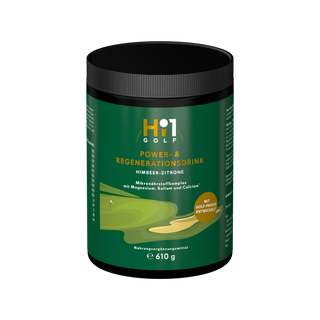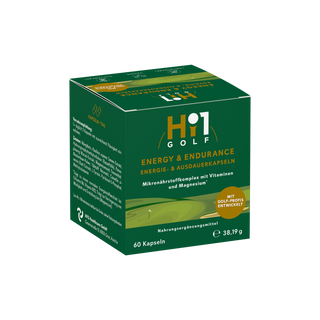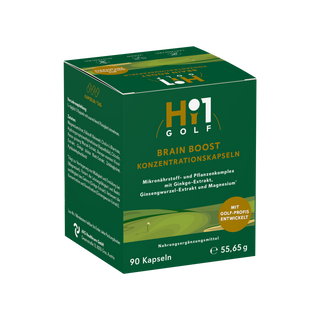Increase your energy level: How to stay energetic on the 18th hole
At first glance, golf may not seem like a typical endurance sport, with players seemingly moving calmly across the course between shots. But this impression is deceptive. A full 18-hole round typically takes four to five hours. It requires keen concentration, precise movement control, tactical thinking, and often several kilometers of walking— depending on the course and playing style, this can be over ten kilometers.
This means that the body is stressed for hours . This is less due to explosive exertion, but rather due to continuous muscular activity, stable posture, balance, and mental focus. Added to this are external influences such as heat, wind, uneven terrain, or waiting times, which further challenge energy levels.
Table of contents
- What physical factors influence energy levels when playing golf?
- How does mental fatigue affect energy levels?
- How can you persevere physically and mentally - until the very end?
- What best supports your energy?
- Why is it so important to drink enough while golfing?
- What practical things can I do to stay fit until the 18th hole?
- How do I build up my energy levels in the long term?
What physical factors influence energy levels when playing golf?
In golf, it's important to maintain physical performance over several hours. However, fatigue often sets in during the second half of the round, especially if energy reserves aren't adequately supported.
Typical signs include heavier legs, declining grip strength, or impaired coordination. Decision-making may also become slower or less clear. At the same time, inner resilience decreases, and minor errors become more stressful. The flow of play is interrupted, and enjoyment of the game may diminish.
This development is often due to multiple factors. Common causes include falling blood sugar levels, dehydration, or suboptimal micronutrient status. Magnesium, for example, plays a role in normal muscle function and energy metabolism. Certain vitamins and amino acids are also crucial for performance. A deficiency can affect physical and mental stability and negatively impact play.
How does mental fatigue affect energy levels?
Golf is not only physically demanding, but also highly mentally demanding. Every shot requires renewed attention, tactical consideration, and emotional regulation. Unlike sports with automated movement sequences, in golf each playing situation must be individually assessed and prepared for.
This constant cognitive activity requires energy, especially in the brain. Mental fatigue often manifests itself in subtle ways: declining concentration, increased distractibility, emotional irritability, or a gradual reduction in cognitive flexibility. Doubt and restlessness can also become noticeable.
This mental strain inevitably transfers to the body. The flow of movement can falter, the swing becomes sloppy, and coordination suffers. Because body and mind are closely linked in golf, mental fatigue is a serious performance factor and can have significant consequences, such as physical exhaustion.
How can you persevere physically and mentally - until the very end?
An 18-hole round of golf can last several hours and is physically and mentally demanding. To remain focused and energetic throughout the entire game, thorough preparation is essential. Regular physical activity benefits from improved endurance, coordination, and resilience on the course.
A balanced diet supports energy metabolism and helps prevent fluctuations in performance. Adequate hydration and conscious recovery breaks are equally important. Sleep and regeneration promote long-term performance and contribute to mental freshness.
On long or particularly demanding match days, it can also be helpful to support the body with specific micronutrients. A concentration and energy supplement from the Hi1 brand, specially designed for athletic use, can support physical and mental processes in such situations.
What best supports your energy?
To remain focused and confident even during the final stages, the brain and muscles require a constant supply of energy and regulating substances. Certain plant extracts and micronutrients can contribute specifically to this:
- Guarana provides naturally bound caffeine, which is released more slowly than synthetic sources. This supports alertness for a longer period without a strong stimulating effect.
- Green tea extract contributes to mental freshness and can help delay fatigue.
- Ginseng has traditionally been used to support resilience. It can promote mental clarity, especially during cognitive or physical exertion.
- Magnesium is responsible for normal energy metabolism, muscle and nerve function, and the regulation of tension. This is especially relevant in high temperatures or when walking long distances.
- Vitamins B6 and B12 contribute to energy production and help reduce fatigue.
- L-tyrosine, an amino acid, can have a regulating effect on mental stress and stabilize mental balance.
A micronutrient supplement with this composition can be helpful in the golf context to maintain performance throughout an entire round, both physically and mentally.
Why is it so important to drink enough while golfing?
Even a slight dehydration can negatively impact concentration, coordination, and muscle performance. Especially on warm days, the body loses not only water but also important electrolytes. These are crucial for impulse transmission, fluid balance, and the stability of muscle and nerve function.
A recovery drink for physically active individuals can help specifically compensate for these losses. Formulations with electrolytes such as magnesium, potassium, and calcium support the body on several levels:
- Magnesium can reduce fatigue and support nerve function,
- Potassium helps regulate fluid balance,
- Calcium is essential for muscle contraction,
- B vitamins such as B1, B2 and B6 contribute to normal energy production and mental alertness.
Whether during the round or for regeneration afterward, targeted fluid and micronutrient intake helps your body stay stable and recover faster.
What practical things can I do to stay fit until the 18th hole?
Before the round
A stable energy balance begins even before the first tee shot. A balanced breakfast with complex carbohydrates provides the body with a steady supply of energy over several hours. Oatmeal, whole-grain bread, or nuts, for example, are suitable for this. Fluid intake should also begin early: Water or a light, isotonic drink is a good way to balance water and electrolyte levels.
In addition, it may be beneficial to take targeted micronutrients and herbal supplements, for example, through an energy and concentration supplement specifically designed for athletic exertion. Such a combination can help stabilize endurance and also support mental alertness right from the start of the session.
During the round
To keep your energy levels from dropping, you should drink small amounts regularly, even if you don't feel thirsty yet. Water, unsweetened tea, or lightly mineralized drinks are particularly good options. Small snacks like a banana, nuts, or dried fruit also provide readily available energy without putting a strain on your stomach.
Additional support can be provided by a recovery drink containing electrolytes such as magnesium, potassium, or calcium. Such formulations help compensate for mineral loss through sweating and stabilize muscle function and nerve conduction. This is especially helpful in higher temperatures or strenuous conditions.
After the round
Even after a game, regeneration remains a key factor for performance. The body now needs fluids, protein, and minerals to replenish its stores and activate the recovery processes. A light meal, supplemented by an electrolyte-rich drink, can support this process.
Gentle forms of exercise such as stretching or easy walking help relieve tension and promote circulation, allowing the body to be specifically prepared for the next exertion.
How do I build up my energy levels in the long term?
A permanently stable energy level is achieved through a combination of regular exercise, targeted training, and a conscious daily routine. Endurance, mobility, and strength training improve physical resilience and regeneration.
Nutrition also plays a key role: It should be balanced and nutrient-rich, containing sufficient amounts of both macronutrients and micronutrients. Vitamins, minerals, essential fatty acids, and proteins contribute significantly to the functioning of muscles, nerves, and energy metabolism.
Sleep is also an underestimated factor: Seven to nine hours per night is considered optimal for staying physically and mentally rested. In addition, regular recovery phases should be ensured. This is especially important during intensive training periods or tournament stress.
In certain situations, it may be beneficial to supplement with selected micronutrients. A supplement to support energy and concentration can be a helpful addition, especially during increased exertion, longer runs, or significant temperature fluctuations, to avoid potential nutritional gaps.
This allows you to finish your game in a controlled and present manner, even under challenging conditions - with a stable swing, clear decision-making skills and a good body awareness right up to the last putt.








